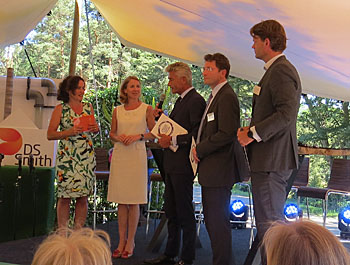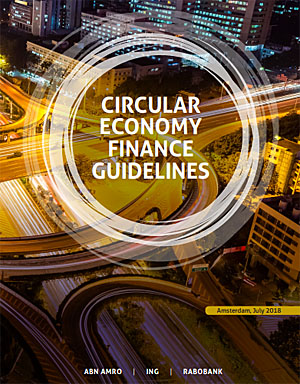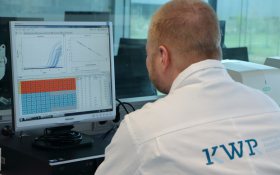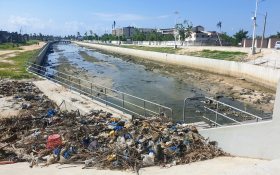Three large Dutch banks publish framework for financing the circular economy
 Dutch banks ABN Amro, ING and Rabobank launched joint circular-economy finance guidelines, inspired by the ambition to create a joint framework for financing the circular economy.
Dutch banks ABN Amro, ING and Rabobank launched joint circular-economy finance guidelines, inspired by the ambition to create a joint framework for financing the circular economy.
The guidelines meet a need for better insight into financial backing for the circular economy and aim to help drive such financing.
They have been formally presented to Stientje van Veldhoven, the Netherlands’ Deputy Minister for Infrastructure and Water Management, on behalf of the FinanCE Working Group, putting the three banks firmly at the forefront of international trends.
 Offiicial presentation of the guidelines by three Dutch banks to depute minister Stientje van Veldhoven (second left) on 2 July.
Offiicial presentation of the guidelines by three Dutch banks to depute minister Stientje van Veldhoven (second left) on 2 July.
Joint framework
The Circular Economy Finance Guidelines aim to promote and develop the key role that finance can play in this transition.
Financial institutions have a major role in the transition from the linear to the circular economy, as the latter sees the advent of a multitude of new business models that require different types of finance.
The guidelines offer a joint framework to pick just the right type of finance for every circular initiative.
Circular economy business models
The Guidelines state that circular propositions are considered to be based on circular business models that generate long-term positive impact.
 Typical circular economy business models include:
Typical circular economy business models include:
● companies that substitute virgin raw materials with secondary
(recycled) materials originating from materials and resources recovery (circular input).
● companies that eliminate/or reduce input of hazardous materials and design for modularity, easy disassembly and repair to facilitate recycling, reuse, life time extension (circular design).
● companies that increase the capacity utilisation of a product or asset during its useful life (sharing business models)
● companies that increase reuse, refurbishment, and emanufacturing to extend the useful life of products and assets (life time extension)
● companies that improve the circularity of the whole supply chain through
product-as-a-service offerings (product-as-a-service)
Economy of the future
On occasion of the presentation of the guidelines, Dutch Deputy Minister Van Veldhoven recognised the importance of widely accepted circular finance guidelines. ‘This is a step-change and it’s encouraging to see this country’s three major banks grasp the nettle. I trust that more financial institutions will follow'.
Van Veldhoven: ‘After all, the economy of the future – the circular economy – deserves greater, swifter and more fit-for-purpose funding.’
Download the Circular Economy Financing Guidelines (as pdf, 6 mB) here.
This news item was originally published on the websites of ABN Amro bank, ING bank, Rabobank.
(Top photo: iStock)
Read also on this website
● SIWW 2018: ReCirc Singapore explores joint r&d and business agenda on engineering zero waste systems, 17 July 2018
● Philips, Arcadis, Rabobank and DSM join WBCSD Factor10 initiative on circular economy in Davos, 23 January 2018
● AIWW 2017: Setting the stage for a circular economy, 20 October 2017
● Circular economy can almost fully undo water stress in California, 9 March 2017
More information
ING
Amsterdam, the Netherlands
+31 20 563 91 11
www.ing.com
Rabobank
Utrecht, the Netherlands
+31 88 7226 767
www.rabobank.com
ABN Amro
Amsterdam, the Netherlands
+31 20 628 22 82
www.abnamro.com



